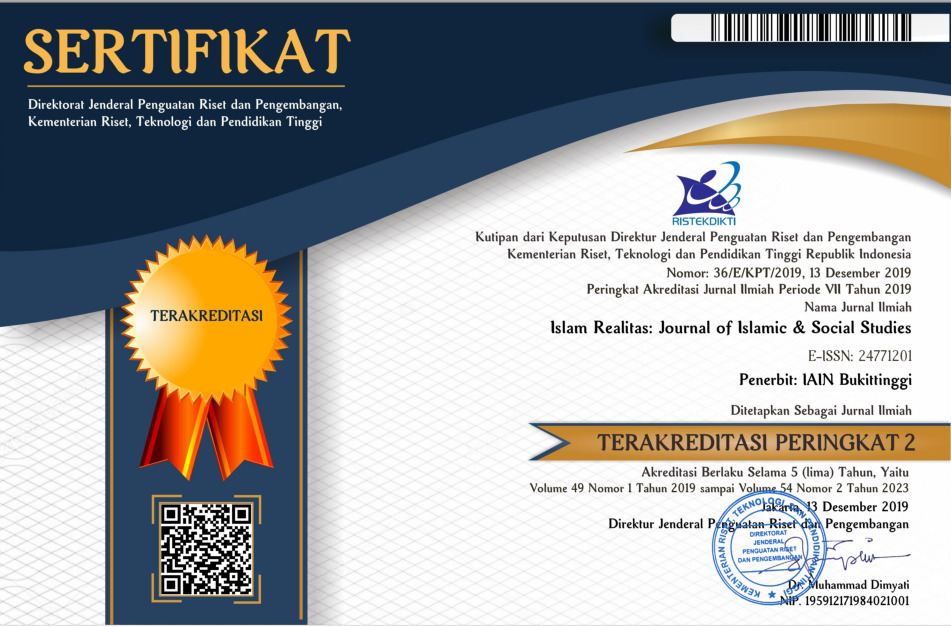Nilai Edukatif Tradisi Peringatan Hari Kematian di Kenagarian Manggopoh, Sumatra Barat
DOI:
https://doi.org/10.30983/fuaduna.v4i1.3182Abstract
References
Abi Aufa, A. “Memaknai Kematian Dalam Upacara Kematian Di Jawa.†Humaniora 1 No. 1 (2017): 1–11.
As-Sidawi, Abu Ubaidilah Yusuf bin Mukhtar. Hukum Tahlilan (Selamatan Kematian Dan Perayaan Haul). Bogor: Media Tarbiyah, 2013.
As-Suyuthi, Imam Jalaluddin Abdurrahman. Kitab Al-Hawi Lil Fatawi. Bairut: Darul Kutub Illmyyah, 2000.
Ash Shidiqi, Tengku Muhammad Hasbi. Kriteria Sunnah Dan Bid’ah. Semarang: Pustaka Riski Putra, n.d.
Bakhtiar. Ranaah Minang Di Tengah Cengkeraman Kristenisasi. Jakarta: Bumi Aksara, 2005.
Buya Damiri. Wawancara, 27 Desember (2017).
Dinas Cacatan Sipil. Data Kependudukan. Data Kependudukan. Dinas Catatan Sipil, 2018.
Karim, Abdul. “Makna Ritual Kematian Dalam Tradisi Islam Jawa.†Sabda: Jurnal Kajian Kebudayaan 2 (2017): 161–71.
Langgulung, Hasan. Asas-Asas Pendidikan Islam. Jakarta: Pustaka Al Husna Baru, 2008.
Muslim, Kori Lilie. “Nilai-Nilai Islam Dalam Budaya Dan Kearifan Lokal (Konteks Budaya Minangkabau).†FUADUNA: Jurnal Kajian Keagamaan Dan Kemasyarakatan 01. No. 01 (2019).
Nawawi, Imam. Riyadhush Shalihin. Jakarta: Darul Haq, 2015.
Ritzer, George. Teori Sosiologi: Dari Klasik Sampai Perkembangan Terakhir Pasmodern. Jogjakarta: Pustaka Pelajar, 2012.
S, Suwito, Hidayat A, dan Agus S. “Tradisi Dan Ritual Keagamaan Wong Islam Jawa.†Jurnal Kajian Islam Dan Budaya 2 (2015): 6–25.
Sadri. “Reorientasi Nilai-Nilai Kepemimpinan Lembaga Pendidikan Islam Muhammadiyah Di Indonesia.†FUADUNA: Jurnal Kajian Keagamaan Dan Kemasyarakatan 3. No. 1 J (2019).
Samad, Duski. Tradisi Malamang Dan Maulud Badikia. Padang: Fakultas Tarbiyah Padang, 2015.
Sarjono. “Nilai-Nilai Dasar Pendidikan Islam.†Jurnal Pendidikan Agama Islam Vol. II, N (2005).
Sugiyono. Metodologi Penelitian Pendidikan. Bandung: Alfabeta, 2014.
Sumbulah, Ummi. “Islam Jawa Dan Akulturasi Budaya: Karakteristik, Variasi Dan Ketaantan Ekspresif.†El-Harakah 14 No. 1 (2012): 52.
Tim Perumus Profil Nagari Manggopoh. Profil Nagari Manggopoh. Agam: Kantor Wali Nagari Manggopoh, 2015.
Umar, M. ALi Chasan. Berita Ghaib & Alam Akhirat. Semarang: Toha Putra, 1977.
Wahid, Abdurrahman. Pergulatan Negara, Agama, Dan Kebudayaan. Jakarta: Desantara, 2001.
Yakin, Hasnul. “Urgensi Akhlak Di Sekolah.†FUADUNA: Jurnal Kajian Keagamaan Dan Kemasyarakatan 02. No. 01 (2018).
Downloads
Published
How to Cite
Issue
Section
Citation Check
License
Authors who publish with this journal agree to the following terms:
- Authors retain copyright and grant the journal right of first publication with the work simultaneously licensed under a Creative Commons Attribution-ShareAlike 4.0. that allows others to share the work with an acknowledgment of the work's authorship and initial publication in this journal.
- Authors are able to enter into separate, additional contractual arrangements for the non-exclusive distribution of the journal's published version of the work (e.g., post it to an institutional repository or publish it in a book), with an acknowledgment of its initial publication in this journal.
- Authors are permitted and encouraged to post their work online (e.g., in institutional repositories or on their website) prior to and during the submission process, as it can lead to productive exchanges, as well as earlier and greater citation of published work (See The Effect of Open Access).





